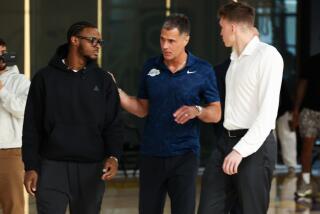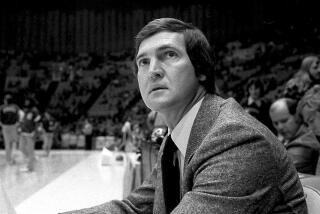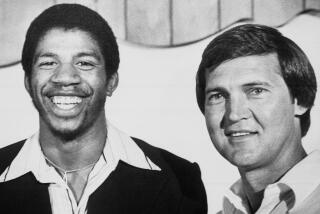Spencer Haywood Sees the Light and Curses the Darkness
When Spencer Haywood came to Los Angeles in 1979 to be the Lakers’ ultimate weapon at power forward, he made an interesting discovery.
Cocaine.
“I knew about it,” Haywood says. “But use it? Cocaine? You crazy ? A joint now and then, sure, but I’m an organic person. I was eating vegetarian foods, I was into yoga and meditation and everything.”
At the time, the Lakers had just signed a promising rookie named Earvin Johnson, and they had some all-NBA-types like Kareem Abdul-Jabbar and Norm Nixon and Jamaal Wilkes.
What they desperately needed was a power forward, to rebound and score and bang.
Instead, they got one who pouted and stumbled and sniffed.
The Lakers traded away a kid named Adrian Dantley to get Haywood, who didn’t last the season. This season, nearly a decade later, Dantley averaged 21.5 points for the Detroit Pistons.
Still, the trade might not have been a disaster if Haywood had given the Lakers two or three Spencer Haywood-type seasons. And he might have done that, had it not been for his discovery.
Instead, he became the first--and so far only--Laker drug casualty, something that was suspected at the time but that Haywood admitted only recently.
“This was my first time in L.A. and I thought I was in Hollywood,” Haywood said in a phone conversation this week. “Cocaine was like the new thing, organic euphoria. It was like perfect. Perfect until the 1-2 punch, because you’re gonna get punched out. We didn’t know that then.”
Haywood was thrilled to be in L.A. He talked of sitting on the shores of the Pacific Ocean, playing his flute. He bought himself a Rolls-Royce. He did coke.
At first he thought he had discovered fire and the wheel in one sitting. This stuff was so nice.
“I was like bragging about it. ‘If you knew what I found last night!’ I would come to practice talking about what a great, joyous feeling it was. ‘I saw the other side.’ I was already a little spacey, I was always looking for the other side. Now I found the secret . I was so (bleep)ed up, it was ridiculous.”
A lot of players around the league then were at least dabbling in this new wonder drug, which to many seemed so harmless. Lots of them quit when they learned more, when they saw the early casualties such as David (Skywalker) Thompson. Most never went beyond dabbling.
Haywood stayed around for the punch line. He began free-basing, and his party was over before it started.
Haywood was a well-traveled 30, and wasn’t expected to be the awesome, thunderous force he had been on a court in his younger day. Still, his play was well below what had been expected. Haywood feuded with then-coach Paul Westhead, and began acting weird, even for him. In the midst of the NBA finals against Philadelphia, during a team stretching exercise, Haywood fell into a coma-like sleep on the gym floor.
He said it was because he had arrived early and had been running laps outside. “By the time practice started I had completely burned myself out, absorbed too much sun,” he explained at the time.
Spencer had burned himself out, all right, but not from too much sunshine.
Shortly thereafter he was bounced off the team like a drunk from a waterfront bar. The Lakers won the title without him, then stiffed him by voting him an insulting one-quarter playoff share.
Next seen, Haywood was playing ball in Venice, Italy, and one joke was that he had been fined for missing a team gondola. But Haywood says he cleaned himself up in Italy. He came back and played another season and a half in the NBA, at Washington, then retired.
He’s still bitter about the L.A. experience. He claims his teammates turned their backs on him when he cried out for help.
Taking sides here is like stepping into the middle of a marital squabble. The more you listen, the more you’re convinced both parties were jerks. Suffice it to say it got to the point where Haywood was not helping the Lakers, and vice versa.
The bad guy was the cocaine.
“It was easy to get, everywhere,” Haywood said. “It’s like a sabotage, against the NBA and every sport. If you’re an athlete, you don’t buy the average stuff, the street stuff. You get stuff that’s 89% coke. Or if you’re cookin’ it up (free-basing), it’s 120,000%.”
Was Haywood cookin’ that season?
“Cookin’? Of course I was cookin’. There was no information. I thought, ‘They all (other drug users) can’t be wrong. They all were.”
Now Haywood is a cocaine missionary. He is now in Detroit, working for a minority development corporation, renovating slum homes. He’s giving free basketball camps that include mandatory scholastic instruction and drug education.
He has read about the problems in Phoenix and elsewhere around the league and he wants to help. One thing Haywood never lacked was enthusiasm. He always charged ahead like a puppy dog, even if he sometimes charged down the wrong alley. Now he’s got a cause.
“I want to get involved with the NBA office, set up educational camps for the new players,” he said. “If (drug information) is coming from a doctor or psychologist, it’s not the same as from one of their peers.
“I’m thinking of going to Phoenix. I just want to step in. The Suns were not given the real . They didn’t sense the real-ness of the person giving them information. The (bleep-bleep)er is, you’re smoking up a stick of dynamite. I would go to every team personally, tell them the importance of what they’re dealing with.
“I’m gonna do something on my own even if I don’t work it out with David (Stern, NBA commissioner). I don’t want (bleep) for it. I’m talking of saving fellow athletes’ lives.
“And kids. We are on TV every day, feeding ‘em gym shoes and haircuts and everything. They’re emulating us so much it’s ridiculous! We can make a change. We are the ones who have the exposure. This is the kind of hero you are, you’re bigger than (bleep)ing life!
“Players can have a serious impact. I seen (kids) turn around when they listen to (me). It’s like the feeling I got when we won the gold medal (in the 1968 Olympics). I love it.”
What is this? The ramblings of a former drug crispie? More misguided good intentions from one of hoopdom’s all-time flakes?
Or is Haywood a guy who has learned a lesson and now has something positive to offer, even if it means becoming the Rambo of the NBA drug corps?
He understands there may be skeptics.
“I’ve been a wild one,” Haywood said.
He still is, but now maybe he can do some good.
More to Read
All things Lakers, all the time.
Get all the Lakers news you need in Dan Woike's weekly newsletter.
You may occasionally receive promotional content from the Los Angeles Times.






